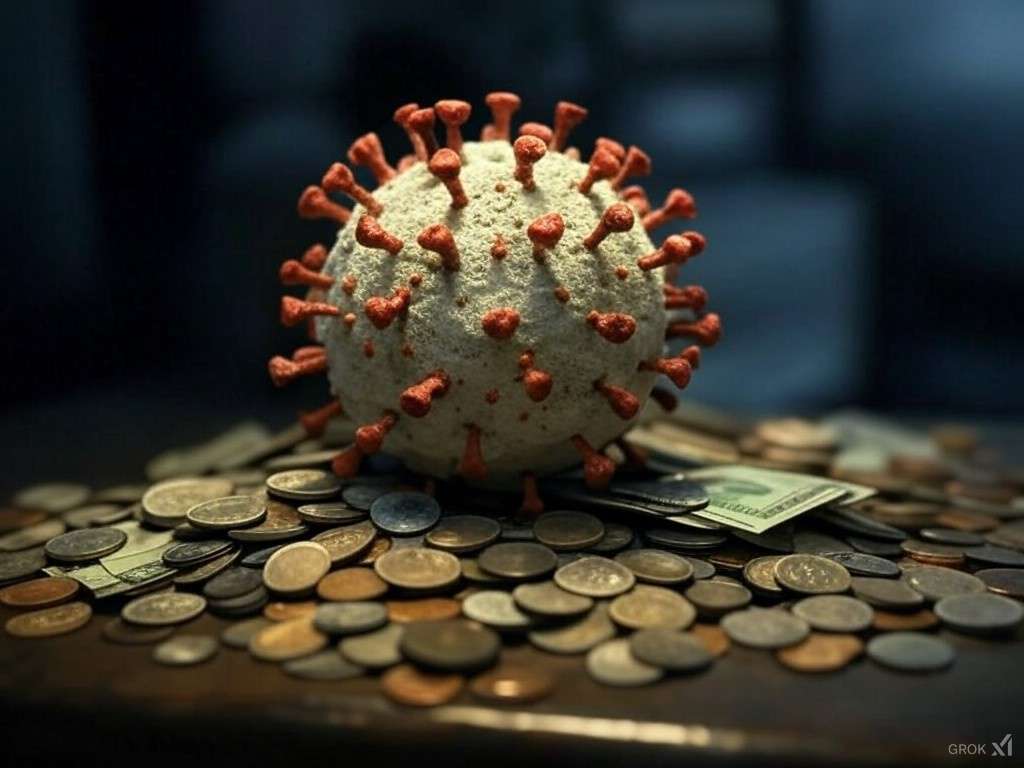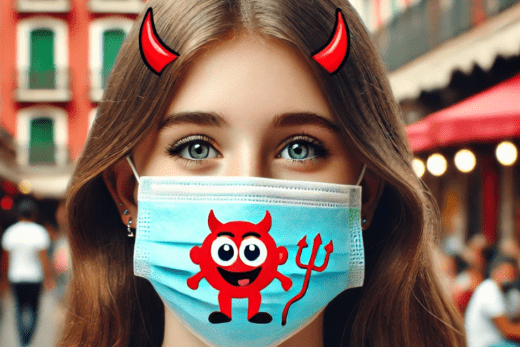
During the COVID-19 pandemic, the medical community was thrust into an unprecedented crisis, navigating rapidly evolving science, public fear, and political pressures. Amid this chaos, two medications—methylene blue and ivermectin—found themselves at the center of heated debates, often vilified and dismissed despite evidence suggesting their potential benefits. Public figures like Joe Rogan were ridiculed and “canceled” for promoting ivermectin, labeled dismissively as "horse paste." This article explores the underlying reasons why these treatments, such as Methylene Blue, faced such vehement opposition and why the healthcare industry may have prioritized profits over patient health.
The Case of Ivermectin: From Miracle Drug to “Horse Paste”
Ivermectin has been hailed as a groundbreaking antiparasitic drug, credited with eradicating debilitating diseases like onchocerciasis (river blindness) and playing a critical role in global health. However, during the COVID-19 pandemic, ivermectin became a flashpoint of controversy. Proponents cited in vitro studies and anecdotal evidence suggesting its antiviral potential against SARS-CoV-2, but public health authorities like the FDA and WHO dismissed these claims, emphasizing a lack of large-scale clinical trials.
The backlash against ivermectin reached fever pitch when prominent figures, including Joe Rogan, reported using it as part of their COVID-19 treatment regimen. Critics mocked its veterinary uses, labeling it "horse paste," despite its widespread human applications. Media outlets amplified this narrative, sidelining nuanced discussions about the drug’s potential benefits. This demonization alienated patients and dissuaded open dialogue, even as some doctors continued to explore ivermectin’s potential in off-label uses.
Why such hostility? One explanation lies in the economic and regulatory frameworks of modern medicine. Ivermectin, a decades-old drug with generic availability, is inexpensive and widely accessible—qualities that threaten pharmaceutical companies’ profitability. Unlike new, patentable treatments like antiviral drugs or vaccines, ivermectin offered little financial incentive for large-scale studies. By dismissing it as a fringe remedy, the medical establishment protected its investments in proprietary COVID-19 treatments, sidelining a potentially valuable tool.
Notable Instances of Misreporting During COVID-19
During the COVID-19 pandemic, the mainstream media faced challenges in accurately reporting rapidly evolving information. While not necessarily deliberate falsehoods, certain instances of misreporting and sensationalism contributed to public confusion. Notable examples include:
Misleading Headlines on Vaccine Safety: Some mainstream outlets published headlines that, while not outright false, were misleading regarding vaccine safety. For instance, a widely viewed article suggested a direct link between a doctor’s death and the COVID-19 vaccine, despite the actual cause being uncertain. Such headlines garnered significant attention, potentially fostering unwarranted fear about vaccine safety.
Early Downplaying of COVID-19 Severity: In the initial stages of the pandemic, certain media outlets underestimated the virus’s potential impact, comparing it to the seasonal flu. This comparison may have contributed to public complacency regarding preventive measures.
Sensationalism and Clickbait: The competitive nature of news media led to the use of sensationalist headlines to attract readership. Such practices sometimes resulted in the dissemination of information that, while not entirely false, lacked necessary context, leading to misinterpretation by the public.
It’s important to note that the rapidly changing nature of the pandemic meant that information evolved quickly, and initial reports were sometimes based on incomplete data. While these instances highlight challenges in media reporting, they do not necessarily indicate intentional deceit. The media plays a crucial role in informing the public, and efforts have been made to correct inaccuracies as more information became available.
Methylene Blue: The Overlooked Alternative
Methylene blue, a compound with proven medical applications for conditions like methemoglobinemia and promising research into neuroprotection and mitochondrial health, also faced neglect during the pandemic. Some early studies suggested that its mitochondrial-boosting properties and potential antiviral activity could benefit COVID-19 patients, particularly those with severe oxidative stress. Yet, like ivermectin, methylene blue was largely ignored by mainstream medicine.
The neglect of methylene blue underscores a broader systemic issue: the preference for high-margin pharmaceuticals over inexpensive, established treatments. With no recent patents or lucrative marketing opportunities, methylene blue stood little chance of being promoted as a front-line therapy, despite its low cost and potential efficacy. This dynamic reflects a healthcare system where economic incentives often take precedence over exploring diverse, evidence-based treatment options.
The Broader Context: Customers vs. Cures
The vilification of alternative treatments during COVID-19 highlights a deeper tension within the medical industry: the prioritization of customers over cures. Modern healthcare operates within a profit-driven framework, where pharmaceutical companies, hospitals, and even regulatory agencies are incentivized to promote patented, high-cost interventions. This profit motive creates barriers to adopting affordable, off-label, or repurposed drugs, even when evidence suggests potential benefits.
For ivermectin and methylene blue, these barriers manifested as:
- Media and Institutional Narratives: By framing these treatments as unscientific or dangerous, the establishment discouraged independent exploration and open debate.
- Suppression of Dissenting Voices: Physicians advocating for off-label use faced professional repercussions, while public figures endorsing these treatments were ridiculed or deplatformed.
- Economic Disincentives: With little profit potential, neither drug received the level of investment necessary to conduct definitive, large-scale clinical trials.
The COVID-19 pandemic further exposed the reliance of the medical industry on long-term customers rather than one-time cures. Vaccines and proprietary antivirals generated billions in revenue, while generic drugs like ivermectin and methylene blue threatened this model. By marginalizing these treatments, the healthcare system ensured continued dependence on high-cost interventions.
Why Doctors May Resist Alternative Treatments
Doctors’ reluctance to prescribe alternative treatments like ivermectin and methylene blue is influenced by several factors. First, regulatory and professional pressures discourage off-label experimentation, especially for controversial drugs. Physicians risk losing their licenses or reputations if they deviate from established guidelines, even when such deviations might benefit patients. Second, many doctors rely on information from trusted institutions, which often align with the pharmaceutical industry’s interests. Finally, the sheer volume of misinformation during the pandemic made it difficult to separate genuine scientific inquiry from unproven claims, leading many to err on the side of caution.
Conclusion: Rethinking the Narrative
The backlash against methylene blue and ivermectin during COVID-19 reflects systemic flaws in the medical industry. Rather than fostering open inquiry and evidence-based decision-making, economic and institutional interests created a polarized environment where promising treatments were vilified. While rigorous research is essential, the pandemic demonstrated the need for a more inclusive approach to medicine—one that values affordability, accessibility, and patient-centered care over profit-driven priorities.
As the dust settles, it is imperative to revisit the lessons of this controversy. Exploring diverse treatment options, investing in research for low-cost drugs, and fostering open dialogue can help rebuild trust in medicine and ensure that the pursuit of health is not overshadowed by the pursuit of profit.
- Methylene Blue Overview (Wikipedia)
- Ivermectin Overview (Wikipedia)
- MedlinePlus: Blood Test for Methemoglobinemia
- Trends in Parasitology DOI Article on Ivermectin
- MIT Sloan Study on Misleading COVID-19 Headlines
- Frontiers in Communication Article on Early COVID-19 Messaging
- MIT Sloan Analysis of Media Sensationalism During COVID-19
- The Atlantic: Why Didn’t Facing a Common Enemy Bring Us Together?
- New York Post: The Left is Using Bogus COVID-19 Research to Censor Their Opponents
- The Atlantic: Revenge of the COVID Contrarians



